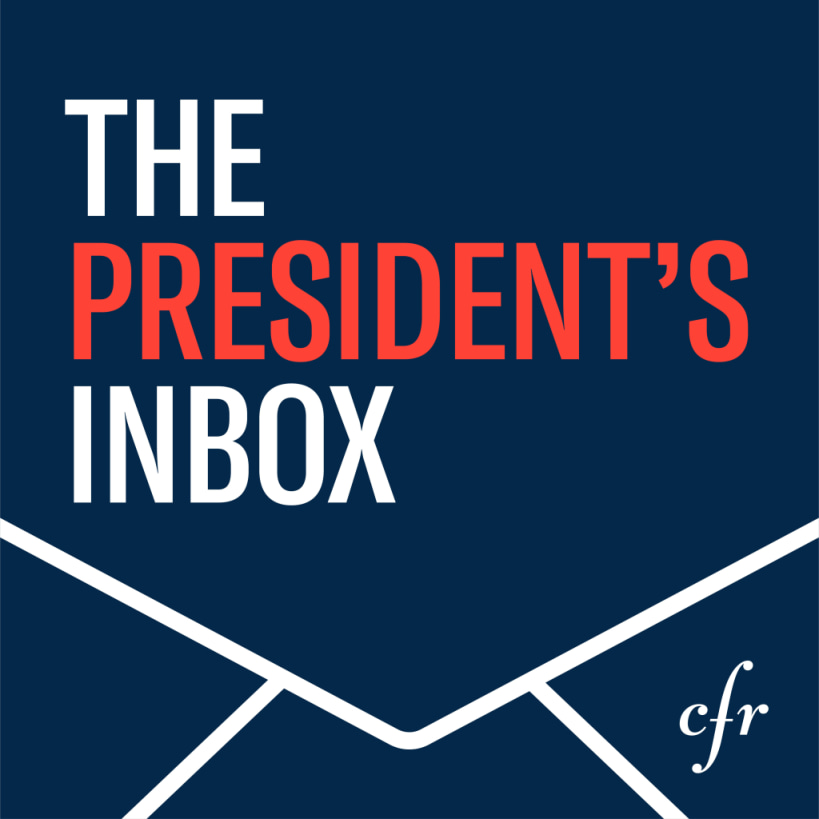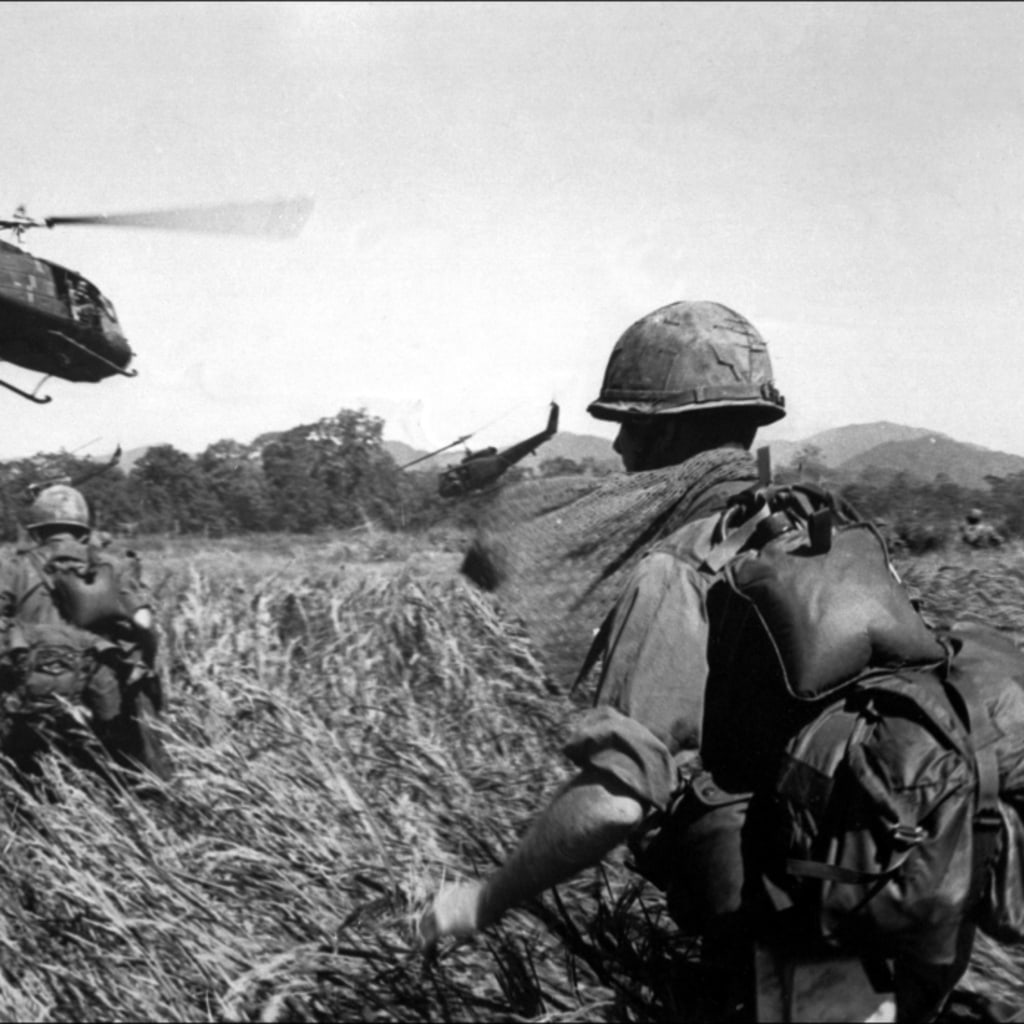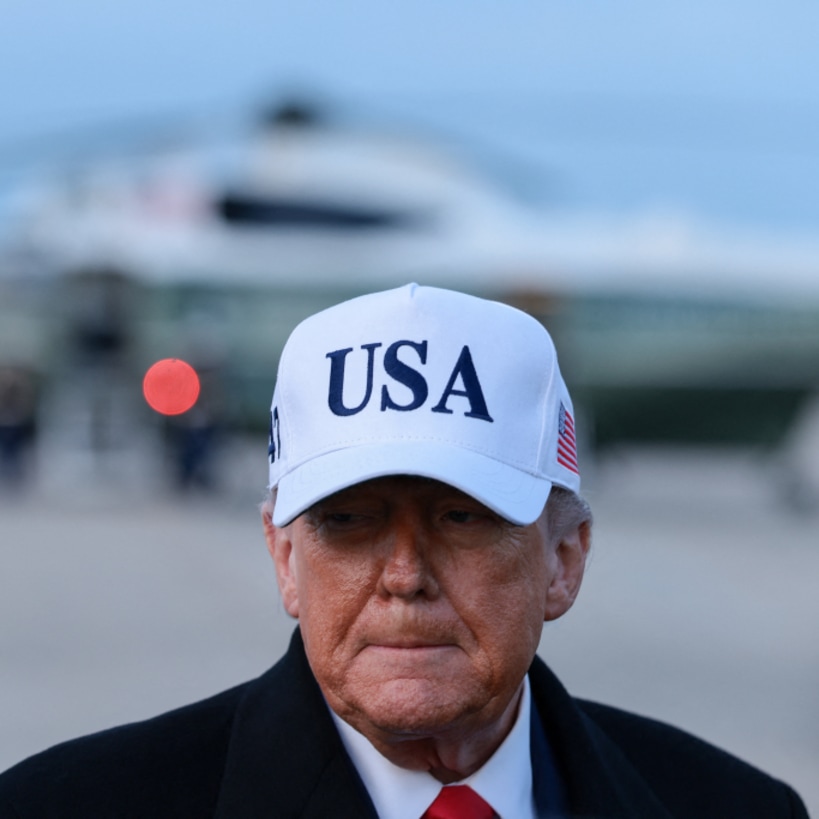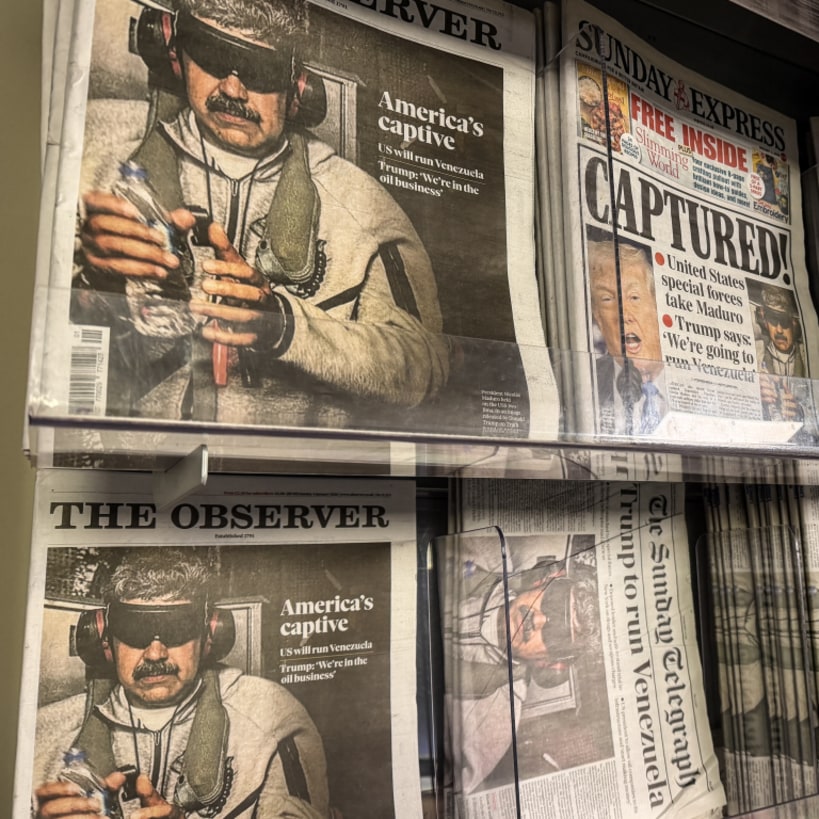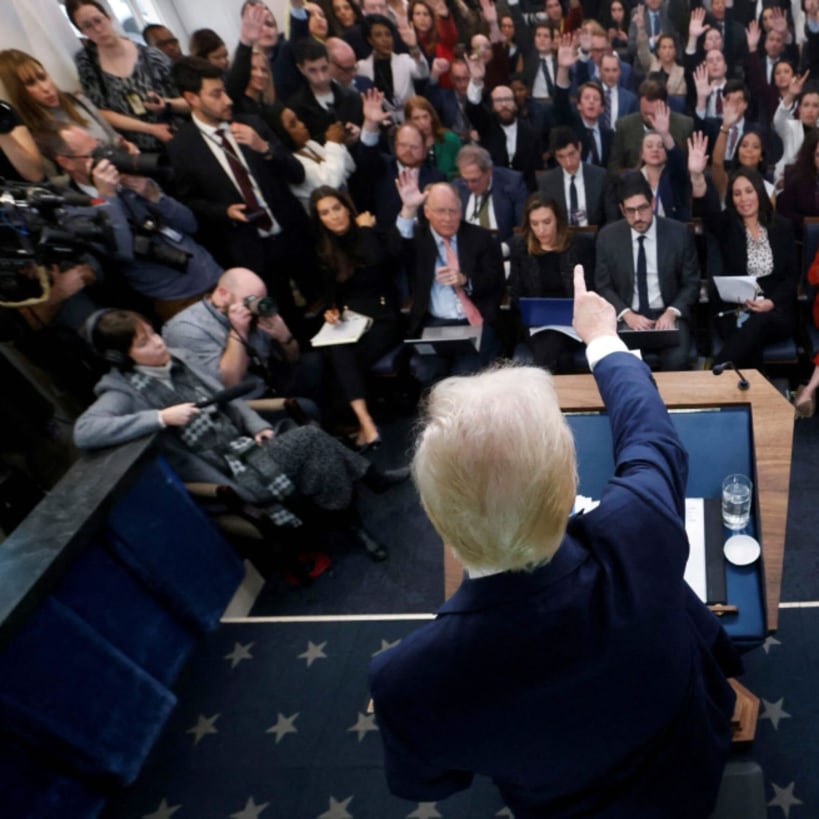Confronting the Nuclear Threat, With W.J. Hennigan
W.J. Hennigan, a correspondent for the Opinion section of the New York Times, sits down with James M. Lindsay to discuss the risk of nuclear war in an era of growing geopolitical competition.
Published
Host
- James M. LindsayMary and David Boies Distinguished Senior Fellow in U.S. Foreign Policy
Guest
- W.J. HenniganCorrespondent of Opinion section, the New York Times
Associate Podcast Producer
- Ester FangAssociate Podcast Producer
Editorial Director and Producer
- Gabrielle SierraDirector, Podcasting
Show Notes
Mentioned on the Episode
“At the Brink,” New York Times
W. J. Hennigan, “How America Made Nuclear War the President’s Decision,” New York Times
W. J. Hennigan, “Nuclear War Is Called Unimaginable. In Fact, It’s Not Imagined Enough,” New York Times
Transcript
LINDSAY:
Welcome to The President’s Inbox, a CFR podcast about the foreign policy challenges facing the United States. I’m Jim Lindsay, director of Studies at the Council on Foreign Relations. This week’s topic is confronting the nuclear threat.
With me to discuss the risk of nuclear weapons in an era of growing geopolitical competition is W.J. Hennigan. Bill is a correspondent for the Opinion section at the New York Times, where he writes about national security, foreign policy, and conflict. He was previously a senior correspondent at Time Magazine where he received the Gerald R. Ford journalism prize for distinguished reporting on national defense. At the Times, Bill is the lead writer of the Opinion section’s new series, At the Brink, which looks at the threat of nuclear weapons in an unstable world. So far, Bill has pinned two pieces for the series. One under the title, “Nuclear War Is Called Unimaginable. In Fact, It’s Not Imagined Enough.” And the other, “How America Made Nuclear War the President’s Decision.” Bill, thank you for coming on The President’s Inbox.
HENNIGAN:
Thank you, Jim.
LINDSAY:
So let’s begin with the question of why this series? Why now, Bill?
HENNIGAN:
Well, we decided to write this series because we feel as though that the world has entered a new nuclear age. After more than a quarter-century of relative peace in the nuclear domain, we’ve encountered a number of different troubling developments. Number one, all nine nuclear nations are modernizing and enhancing their arsenals. Number two, the guardrails that were put into place in the Cold War and afterward to save us from some miscalculation or misunderstanding have slowly unwound between the United States and Russia. Now we’re left with only one remaining major treaty, New START, and that’s been suspended and will expire in less than two years. And the third thing is the current conflicts that we have in Ukraine, in Gaza, as well as the future conflicts which have nuclear components. I’m talking here of course about on the Korean peninsula, in the Taiwan Straits. All of this was very concerning development, and we felt as though that there’s not enough discussion going on about nuclear weapons. We wanted to provide that for our readers.
LINDSAY:
Okay, fair point. Thank you for setting the table so ably, Bill. One just technical question that I have to ask, the series is billed as being from the Opinion section rather than being from the Times’s News section. Is there anything I should make of that?
HENNIGAN:
No. I think the News section has done a fine job at unpacking the various concerns, but it was in the Opinion section and our leadership with Katie Kingsbury, who oversees the section, she felt as though it was a concerted... That this was something that she wanted to put under the Opinion brand and really put all of the multimedia arms that the Opinion section has into it. I’m talking here about audio, and video, as well as the printed word.
LINDSAY:
I should be clear here that the pieces you’ve written are accompanied by various multimedia features including graphs, visualizations, and things like that. Let’s drill down on what we’re witnessing. I think you’re quite right, Bill, that it’s certainly a much more troubling time on the nuclear front than it was for the past three decades, part because after the collapse of the Soviet Union, I think most people assumed that the nuclear threat had receded. We were entering a new period of great power cooperation, and that proved not to be the case. I just want to look at it. What are you most troubled about in terms of the current environment? Is there a particular issue or threat that you think stands out first and foremost for discussion?
HENNIGAN:
Yes. I feel as though the lack of diplomacy in this space is deeply concerning. Since the Reagan administration, there was these intense work that was being done to identify weapons that were mutually menacing and eliminate them on the Russian and U.S. side. That is an iterative process. This is not something that just takes place. These treaties are not born out of one or two meetings. They’re born out of years of spade work and interaction between the diplomats, many of whom developed that trust because trust is not just given. It’s built up over time. These sorts of careers are built with these interactions, and you can go the next step because you’ve made the previous one.
Anyway, we don’t have any of that right now with Russia. We’ve abandoned our strategic stability talks with them, and they do not show any willingness to reapproach that. And China has also been very cold to any discussion about arms control. They flat out declined us for multiple administrations, only now seem willing to at least broach the topic, but it’s the lack of progress in this space that I think is the most concerning.
LINDSAY:
I want to pick your brain a bit about the Chinese reaction, because my sense in talking to Chinese academics, when you raise this issue, that China seems unwilling to open up arms control negotiations or even preliminary conversations just about transparency and clarity in terms of the ongoing expansion, modernization, development of the Chinese nuclear infrastructure, the immediate response you hear back is, “You should worry about the United States and Russia because you have so many more weapons.” The United States, depending upon how you count, has 3,700 warheads. The Russians probably closer to 4,500. Chinese officials say, “We’re small. We just have 410. We’re not the problem, you are.” How do you react to that line of argument?
HENNIGAN:
Well, I feel like they do have a leg to stand on. I mean, it is a rational point of view. They want to be looking to the U.S. and Russia at an eye level rather than looking up when it comes to their arsenal size. But if you believe the U.S. intelligence estimates, they’re on pace to have 1,000 warheads by decades end and 1,500 warheads by 2035. Again, these are still a third of what the United States has or less than that. But when it comes to the number of deployed weapons that the United States and Russia has under New START, it’s 1500.
And as I alluded to before, these arms control discussions, they don’t produce products overnight. They are a product of many years, so just setting that groundwork is important to do. And the other alarming thing that you brought up is that opacity of we don’t really understand...China’s not articulated why it’s building up its arsenal at such a breathtaking pace. Very little has been published about this as well. Through those conversations, I believe you’re able to get some insight into what both sides are aiming to do, as well as what they don’t want, and that is a miscalculation or mistake that could end up with all of us being in trouble.
LINDSAY:
Well, certainly, Bill, the changes in the Chinese arsenal are significant because for four, five, six decades, China had pursued, what’s called in the business, a minimum deterrent posture. Just wanted to have enough weapons around in essence to try to deter a second strike. It wasn’t interested in building up the capacity for what’s called a war fighting posture in nuclear weapons if you could in fact fight a nuclear war in a meaningful sense with nuclear weapons.
But that raises a second issue that I heard coming from Chinese academics and Chinese officials in these conversations, where they say, “Listen, even if we are modernizing our arsenal, yours is larger. You’re modernizing it as well, but we’re the country, China, that has adopted this position of no-first-use. The United States hasn’t.” So again, Chinese putting the burden back on the United States. How do you react to that?
HENNIGAN:
Well, I do think that their rapid expansion of their arsenal draws reasonable questions about whether China is keeping to its no-first-use policy or is moving to a launch-on-warning policy. They’re ringing the Pacific with these range missile dual use nuclear and conventional missiles. Their concerns, from the military point of view from the Pentagon, if you believe it, that they are making this move even if they do say publicly that they’re retaining this. As you know, there’s a long history of China standing on moral grounds about the fact of their no-first-use policy, but there are clear doubts about that within the U.S. And I think even... They’ve requested the United States to make the same pledge to go to a no-first-use stance.
And I’m not quite sure whether or not they’d believe the United States if they did make such a pledge, even though that’s what they say they desire, so I think that this is probably the best opportunity for the two sides to actually have a discussion. Because for so long, it’s been a log jam in this regard or just outright stonewalling by Beijing about willingness to engage, but here we have a little crack in the door of ways that the two sides can actually hammer out and see one another’s point of view and why they are sticking to their guns for this particular issue.
LINDSAY:
You’re right, Bill, to flag the fact that a no-first-use pledge, in and of itself, may not be meaningful if it is simply a pledge, because you can change your mind down the road. Configuring your nuclear forces so that it’s hard to launch is a much more complicated issue and can create all kinds of reverse incentives, because obviously, you don’t want to do anything that would run down your deterrent and encourage your first strike. It’s lots of books, articles have written on that.
But that gets us to the real complexity of the new nuclear age, if I can use that phrase. And that is an era I grew up it was a bipolar, it was two superpowers. If you think in game theory, it was actually relatively simple. We watched the Soviets, the Soviets watched the Americans. But now, as you consider this, you have to worry about the interactions of not just the United States, Russia, China, but then smaller country referred to North Korea. But also if you’re Chinese, you have to think about your strategic position vis-a-vis India, what India has. India has to worry about China and Pakistan. All of a sudden, it gets a lot more complex, but let’s just bite a piece off of that. How do you think about the Russian part of this equation? Because as you described, we built this huge arms control edifice. Took it decades to do, but almost all of that is gone now. I think it’s safe to say U.S.-Russian relations are not in a great place right now, but obviously, the Russians have a very big sophisticated nuclear arsenal. Even more so, they talk about nuclear weapons being a key part of their military posture.
HENNIGAN:
Right. I mean, there’s a few things there with Russia. I mean, number one is the fact that they do have the world’s largest arsenal, as you said earlier. The second thing is that while the United States, after the dissolution of the Soviet Union decided to rid themselves of all of the tactical nuclear weapons. By this, I mean the lower yield, shorter range weapons. Not city-busting H bombs, but weapons that are somewhere in the Hiroshima level and below kiloton range. Again, we’re talking about substantial amounts of explosive power here, no doubt.
LINDSAY:
Right. These were designed in theory you were going to use them to supplement what was happening on a conventional battlefield. They weren’t being delivered into continental distances.
HENNIGAN:
Precisely. They’ve retained what U.S. intelligence estimates is around two thousand of these weapons, which take various forms. These are short-range missiles or they are artillery, these sorts of things. In the U.S., we also had thousands of these sorts of weapons. Some, they’re so small that fit in a backpack, death charges, all sorts of crazy things that the Cold War brought out.
LINDSAY:
I think it had a lovely description, something like, small atomic demolition munition.
HENNIGAN:
Exactly.
LINDSAY:
Some acronym like that.
HENNIGAN:
Yeah, yeah. If you Google a backpack nuke, you’ll find more than you care to know. But these weapons are of particular concern, particularly in Ukraine, because for all the posturing that Vladimir Putin has made, the fears were palpable and still remains so, that tactical nuclear weapon might be used if Ukraine is threatening on Crimea, for instance, or threaten thousands of troops, Russian troops, put their lives in danger. These weapons, I think, are very destabilizing. Also with Russia’s...Their unwillingness to take up the White House’s offer to start negotiating follow-on treaties to New START.
I mean, we’re really on the cusp here of going to the bad old days of having unrestricted stockpiles, and there will be calls, as you point out, of this three-body problem with Russia, China, and the U.S. There will be calls, and you already have heard murmurings of this about the United States needing to have as many nuclear weapons as both Russia and China combined because of the stronger ties that you see between those two nations. Whether or not you buy into that or not, doesn’t matter, but the fact that we are headed in the opposite direction, and for so long, we were talking about continual reductions since 1972.
LINDSAY:
Well, in the ‘60s we get up to nearly fifty, sixty thousand warheads in terms of the two superpowers. It’s easy to see how they can go back in that direction, because if the United States makes it a matter of policy that we have to have as many weapons as the Russians and Chinese, and if they don’t want to be outpaced by the United States, that’s your classic arms race dilemma.
HENNIGAN:
Precisely. There’s a big problem internally in the United States. This was a bipartisan issue during the Cold War, right? I mean, both sides agreed to the fact that, “Okay, why are we continuing to dig this hole? We have a good agreement here. Let’s agree to it with the USSR.” It’s also a cost issue, because these weapons are extremely expensive. But now, the idea of a bilateral treaty with Russia or a multilateral treaty with Russia and China, the idea that that would be ratified by the Senate, that is as remote as I can think of.
LINDSAY:
Well, even back in the old days, it was very hard to get arms control treaties approved by the Senate and quite famously SALT II never made it.
HENNIGAN:
Right, that’s correct. But we did have a series of agreements that did go through it and granted it, it wasn’t the easiest thing to come to these agreements to get these things ratified, but they did indeed happen. Also, they were a product of very close calls. You looked over the brink in the ‘80s and particularly 1983, which was a really dangerous year between the United States and the Soviet Union. I just hope it doesn’t take a downing of an airliner or some of the various things that occurred during that tense period of time for the United States to understand that this is in the United States interest as well as our perceived adversaries.
LINDSAY:
Well, but you certainly have to hope that our perceived adversaries understand the nature of the threat that they’re playing with, and that gets us to Vladimir Putin’s frequent allusions to using nuclear weapons. My understanding, Russian military doctrine talks about this concept of escalate to deescalate. You might use a nuclear weapon particularly against an adversary that’s not nuclear, as in the case of Ukraine, to force a settlement. What do you make of Russian military strategy on that point?
HENNIGAN:
There are arguments on either side as to whether or not that is doctrine, that that is part of Russian policy. What do I think about the policy, the strategy writ large? I think that this is something that we see the Russians drill. There have been documented cases throughout the years of, in exercises, the Russians being involved in a conventional war and then using a tactical weapon in the middle of it. I think that it’s a very destabilizing concern. And the fact that there is some open question as to whether or not this is a Russian policy raises questions about the way that we need to respond. And so if one of these weapons are used, and various American military generals have stepped in front of Congress and talked about this, when they war game this thing out and a small weapon is used, it goes badly very quickly, because the tit-for-tat escalation, it’s hard to get off that ladder once you’re on it. And so I feel like any use of a weapon, even if it’s in the sub kiloton range, will set off this domino effect that risks, ultimately risks Armageddon.
LINDSAY:
Do you think that applies in a case like Ukraine where the United States is not an active party to the fighting in terms of providing combat troops?
HENNIGAN:
I think that is one of the biggest questions. The United States cannot just allow that to happen. I think there was a real tense time in the fall of ‘22. The United States did a lot to deescalate the situation and be prepared for possible nuclear use in Ukraine, because Ukraine was on the march. It looked like thousands of Russian troops were going to be in danger and really collapse. In any case, the United States worked with both partners and adversaries, like China, to influence Moscow and to let them know of the withering consequences that would be coming their way, both economic and militarily, should they go nuclear. Now, do I think that the United States would automatically drop a nuke in Russia or Belarus where Russia has recently stationed their troops and intermediate nuclear forces? No, I’m not sold on that idea. I don’t think that this administration, at least, would go that far. But there is an open question as to how far the U.S. is going to be willing to go, because they’re going to have to do something.
LINDSAY:
You haven’t reported on this yet in this series, but I’d like to get your thinking on it anyway, and that is, where do you think missile defense fits into this conversation? And I ask for the following reason. Just like for many people, it seems obvious that having more nuclear weapons than your adversary is a good thing. I think, for many people, the notion is if they have the ability to hit us, then obviously, the best thing is for us to have a defense that can shoot it down. How do you react to those arguments?
HENNIGAN:
Well, I think that when the George W. Bush administration pulled out of the Anti-Ballistic Missile Treaty in 2002, that was arguably the beginning of this unwinding that we’ve witnessed over the last twenty years of the various agreements between Russia and the United States. And I think that Russia’s new novel systems that they’ve developed, and here I’m talking about this underwater drone that will transit the Atlantic Ocean and then detonate on the east coast of the United States, and these sorts of...The nuclear-powered cruise missile that they currently have, or the hypersonic systems, all these gee-whiz weapons that Putin unveiled several years ago and now are entering...Either they are being tested or they’re currently being deployed, that’s all a product of the fact that...The ways to get around our ballistic missile systems. They’ve developed...For every defense, the offense is going to create a way around it. The ingenuity there, it’s a cat and mouse game. There’s always going to be a way to get around your defense. This is as old as warfare. This is just the way it goes.
Also, I should also point out that our ballistic missile systems for intercontinental range systems aren’t very good. Not only do they have not that good of a test record, they’re not designed to be able to shoot down the hundreds of weapons that would be coming our way should Russia or China decide to launch. They’re only designed to shoot the ones and twosies from a North Korea or Iran. As we’ve seen within the last ten years, North Korea is far beyond that ones and twos delivery system anyway. I think that missile defense systems play a large role into this, but I am not that confident that defense systems can keep up with the offensive capabilities that we’ve seen over the last several years.
LINDSAY:
Bill, let’s talk about what happens when deterrence breaks down. You wrote a piece looking at what would happen if nuclear weapons were launched at the United States. And you were concerned about what you found. Tell us about it.
HENNIGAN:
Well, I don’t think that most Americans understand that the United States is a nuclear monarchy. We invest all of our decision-making powers into one person. That’s been the case since 1945, when President Truman gave the okay to drop the bombs on Hiroshima, Nagasaki. That’s particularly concerning. Luckily, we’ve been able to avoid this Armageddon over the last seven or almost eighty years. But we have had presidents, President Nixon and President Trump, which have drawn concerns from both internally, within their own administration, as well as within Congress about their willingness to use weapons out of hand.
LINDSAY:
When you say Richard Nixon, you’re referring to during the final days of the Watergate crisis. There was concerns about what he might do.
HENNIGAN:
He was deeply depressed, and he was drinking often. I outlined this briefly in the story that you mentioned. He called up U.S. Strategic Command, which oversees all U.S. nuclear forces. In order to up targets in North Korea, he wanted to see recommendations on which targets he could drop a nuke on before Henry Kissinger was able to step in and void that. Also, we remember recently in the days after January 6, Nancy Pelosi had concerns about whether or not Donald Trump was going to reach for the nuclear arsenal.
LINDSAY:
And General Milley communicated with Chinese counterparts to tell them not to worry that they would prevent any escalation.
HENNIGAN:
Precisely. In both cases, though, we have Kissinger and Milley, which stepped in and said, “We won’t allow this to happen,” but they have no legal basis to do so. As I argue in the piece, it makes good sense for the United States to develop, to ensconce the law to do what we think every U.S. president would do, which is bring in his most senior advisors, ask for their advice, and then give an up or down vote on whether or not they think that we should use nuclear weapons first. As I say in the article, at least two of three such designated officials should be necessary on the record in order for the process to move forward.
LINDSAY:
It’s what we call a dual key system.
HENNIGAN:
Yes, right. In the other event of being able to respond to a nuclear attack, I don’t think that it makes much sense to introduce another more hand-wringing into that process. I mean, anybody can tell you that it’s just impossible to come to some conclusion within fifteen minutes. We’re talking about the stakes of the world here.
LINDSAY:
At that point, the response time is so short. Whether it’s fifteen minutes, twenty minutes, very little time.
HENNIGAN:
Yeah. I mean, it might be seven, so I don’t feel like introducing anybody else into that process makes any sense.
LINDSAY:
Well, there’s always been the question, Bill, in that sense, that if a massive attack has already been launched, should you respond at all? Because the purpose of having these weapons is to deter an attack. You can argue that back and forth in a lot of dimensions. Moral, theological, strategic, and what have you. I do think the more interesting question is the prior one you pose, which is making the decision to be the first to use nuclear weapons. I’m not sure that your suggested recommendation would work, because presumably, the president is empowered with the constitution as the commander-in-chief and no statute can override a president’s constitutional authority. What would stop our president for saying, “This law is unconstitutional. I’m not going to follow it”?
HENNIGAN:
This is what the Biden administration is currently wrestling with. I spoke with President Biden’s National Security Advisor, Jake Sullivan, and he described the situation just as you did, which is this is almost like a theological sort of thing. I know that he has tasked the NSC to come up with potential solutions to this to add more oversight to the process before the next election. We’re talking about two candidates who are the oldest in our nation’s history to ever run for president, and the idea voters are going to have to make a decision about who they feel is more fit to make that decision. Another layer of oversight makes good sense to me, and I’m sure that the American public would agree. Investing that power in one person to end the world seems a little crazy.
LINDSAY:
I just want to say here, Bill, as someone who’s now older as opposed to younger, I’m not sure necessarily that younger people might not be prey to many of the same pathologies of decision making that affect all of us. I’m not sure that the situation changes even if we had presidential candidates who were younger than the current crop. So tell me, Bill, what’s next up in the series? What else are you going to be covering?
HENNIGAN:
Well, we plan on tackling a number of issues in the nuclear space. But one thing, some of them, we discussed, of course. We’re talking about the introduction of China into a nuclear peer here and how that’s disrupting the stability that we’ve known throughout the nuclear age, Korea and the Korean Peninsula, as we’ve discussed. But more than anything, I think that readers can expect to see the same sort of interactive, nuanced opinions that we saw in the opening phase of the series. This has not been a topic that’s been front of mind for many Americans and for good reason. There’s a lot of things to worry about, but what we do want our readers to do is to be able to understand the situation that we’re currently in and that things can be done about it.
At the very least, there should be a political debate about it, because there’s been very little in the public space among our nation’s leaders to really engage with this issue in a meaningful way. And we’re in the middle of a presidential election, and I feel as though that we should hear our potential presidents talk about these issues and how they see them going forward. I liken this a lot to climate change, which is we often think about these things in terms of existential dread, but really what we want to do is be able to influence policy so that the geopolitics is in such a place where we feel safer rather than feeling like things are getting worse.
LINDSAY:
On that note, I’ll close up The President’s Box for this week. My guest has been W.J. Hennigan, correspondent for the Opinion section at the New York Times. Bill, thank you for the excellent conversation.
HENNIGAN:
Thank you, Jim. I really enjoyed it.
LINDSAY:
Please subscribe to The President’s Inbox on Apple Podcasts, YouTube, Spotify, or wherever you listen, and leave us a review. We love the feedback. The publications mentioned in this episode and a transcript of our conversation are available on the podcast page for The President’s Inbox on CFR.org. As always, opinions expressed in The President’s Inbox is solely those of the host or our guests, not of CFR, which takes no institutional positions on matters of policy.
Today’s episode was produced by Ester Fang, with Director of Podcasting Gabrielle Sierra. Special thanks go out to Michelle Kurilla for her research assistants and to Justin Schuster for his editing assistance. This is Jim Lindsay. Thanks for listening.
